Phanar, Vatican or State Department: what forces are behind Tomos of OCU
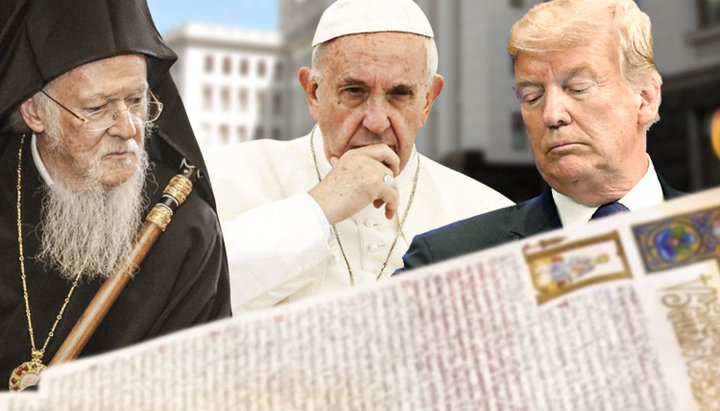
What external forces seek recognition of the Ukrainian schismatics and what Orthodox Christians can expect from this.
From the very beginning of the “Local Church” project, it was obvious that the “autocephaly of the Ukrainian Church” was a joint offspring of several political and ecclesiastical structures, among which more prominence should be given to the State Department of the United States of America.
The union of the Church of Constantinople and the State Department, which its members do not consider it necessary to conceal, has a common specific goal – to weaken the Russian Orthodox Church. Each of the participants of this union hopes to receive their dividends. And if the Phanar, with the help of the Tomos of the OCU, hopes to affirm its position as the “first without equals” in world Orthodoxy, the State Department uses the Tomos just as a means to achieve certain goals in asserting US global hegemony.
A big statement? Hardly that. We offer you a brief analysis of the actions of this structure of the American state.
Religious levers of the State Department policy
On July 17, an exhibition dedicated to the 35th anniversary of the official establishment of diplomatic relations between the USA and the Vatican opened in Washington. At the event that brought together former and current ambassadors of both countries, the Vatican’s foreign minister, Archbishop Paul Gallagher, said that relations between the United States and the Holy See are “strong and durable”. In turn, the former US ambassador to the Vatican, Jim Nicholson, said that the collapse of the Soviet Union can be called the best evidence of the effectiveness of cooperation between the states.
These and similar statements clearly and unequivocally show that America has always used the religious factor to achieve its goals in world politics. And this is not only about cooperation with the Roman Catholic Church, but also with Orthodox hierarchs, primarily the Constantinople Patriarchate.
Half a century ago, during one of the first interviews to the “Evening Independent”, the newly elected Patriarch Athenagoras of Constantinople said: "I will always promote America and American interests, live by American ideals and preach them."
Modern representatives of the Constantinople Patriarchate also do not hide close cooperation with the State Department. This is, for example, what Fr. Alexander Karloutsos, Executive Advisor to the “Faith: An Endowment for Orthodoxy and Hellenism Foundation” (the foundation’s goal is to finance the institutions of the Greek Orthodox Archdiocese of the USA), says: “Even our political ties to the Oval Office began when then Archbishop Athenagoras was called in November of 1948, to lead the Sacred See of Saint Andrew as part of the Truman Doctrine and Marshall Plan, to keep the First Throne of Orthodoxy from being trapped behind the Iron Curtain and falling into the communist hands of Stalin’s Soviet Union.”
In diplomacy, it is not customary to make frank statements, except perhaps post factum. Therefore, it can be inferred about the joint actions of the State Department and the Phanar to promote their common interests on the basis of publicly available facts, which are many.
US State Department – Phanar relation in the USA
When on May 11, 2019, Metropolitan of Prussia Elpidophoros (Lambriniadis) was elected the new archbishop of all Greek parishes in the United States, many church leaders and analysts concluded that this election was not accidental.
The head of the Department for External Church Relations of the Russian Orthodox Church, Metropolitan Hilarion (Alfeyev) of Volokolamsk commented on the appointment of Elpidophoros on his Twitter: “Metropolitan Elpidophoros, the main ideologist of the legalization of the Ukrainian schism and the main hater of the Russian Church in the Patriarchate of Constantinople, became the head of the American Archdiocese. And this is a direct path to the Patriarchate. The restoration of unity seems to be postponed for a long time.”
"I will always promote America and American interests, live by American ideals and preach them. I will never forget this great country."
Patriarch Athenagoras of Constantinople
The words of Vladyka Hilarion provoked a dissatisfied reaction from some secular observers who wondered why the US See should be called a direct path to the patriarchate? After all, for example, the same Patriarch Bartholomew was never the archbishop of America, but he became the patriarch.
However, given the incredible struggle for recognition of the Ukrainian Tomos by the Local Churches, the appointment of Elpidophoros fits into the context of the future patriarchate as well as possible.
Met. Elpidophoros, who also received the title of “Exarch of the Atlantic and Pacific Oceans”, is one of the ideologists of the Ukrainian autocephaly and the most active preacher of the unlimited power of the Patriarch of Constantinople. It can be assumed that he will become the person through whom the State Department will help the Phanar to exert pressure on the representatives of the Local Orthodox Churches to recognize the OCU. And this assumption is not unfounded.
On June 14, the spokesperson for the OCU Eustratiy Zoria and Clement Kushch, another “hierarch” of this structure, were noticed in Met. Elpidophoros’s company at a US State Department event organized in order to protect religious freedom in the world.
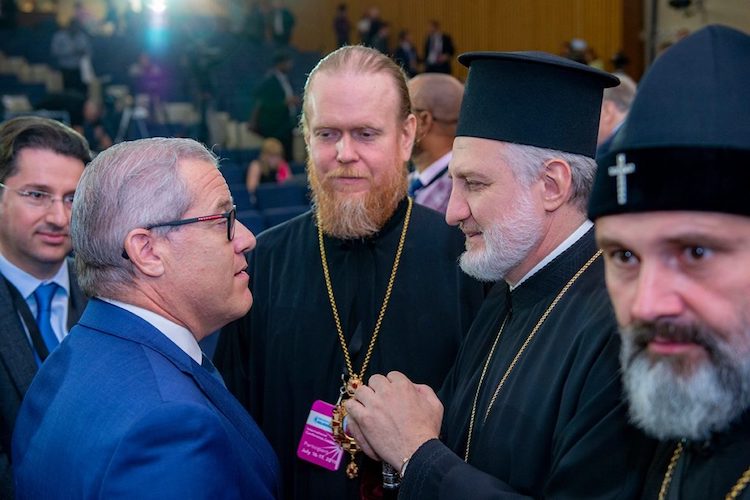
On the same day, Metropolitan Elpidophoros met with US President Donald Trump, and the very next day the US Senate adopted a resolution welcoming the creation of the Orthodox Church of Ukraine and calling it "an important milestone in Ukraine’s building its own future free from Russian influence".
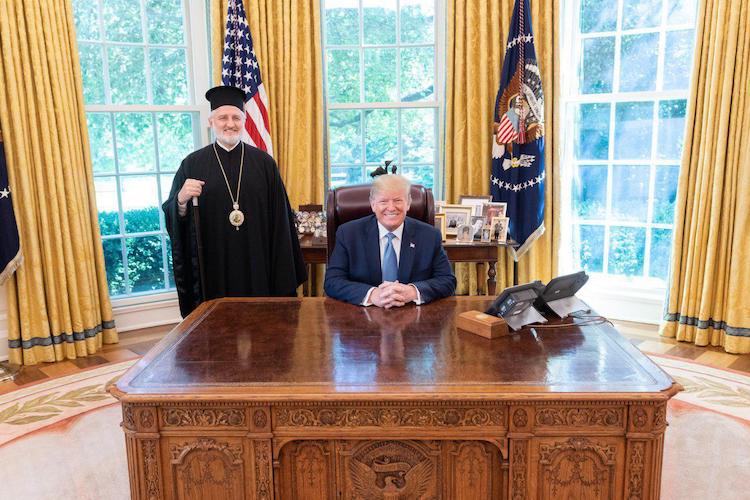
Elpidophoros met with Trump in the presence of US Vice-President Mike Pence, US Secretary of Health and Human Services Alex Azar and Elpidophoros's closest aide, Fr. Alexander Karloutsos, who is called the "Minister of Finance" of the Constantinople Patriarchate and the "gray cardinal" of the American Archdiocese. This allowed some Orthodox analysts to conclude that Elpidophoros in the White House was passing an aptitude test.
A little later, it became known that Metropolitan Elpidophoros met with US Secretary of Commerce Wilbur Ross. The meeting again was attended by Fr. Alexander Karloutsos. Considering that his foundation finances the archdiocese and donates to the treasury of the Constantinople Patriarchate, the minister and the archbishop discussed financial issues.
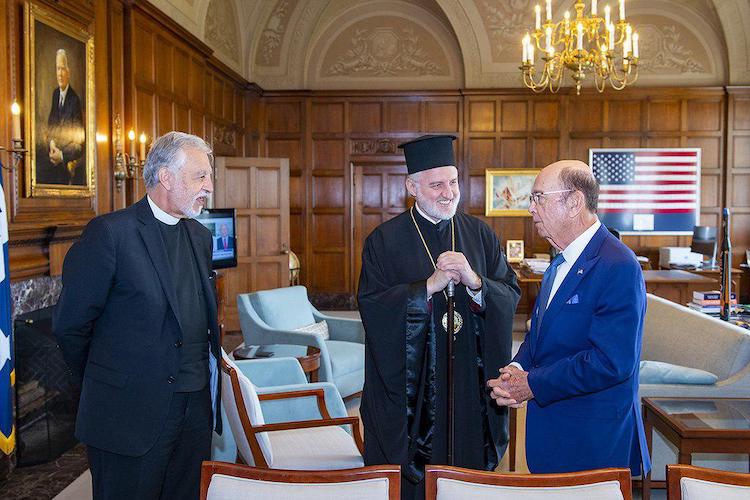
We recall that the purpose of creating the OCU, according to US senators, was “to prevent Russian influence”. However, it seems that by preventing the “Russian influence”, the Phanar does not fear the American influence. Moreover, it is grateful for it.
On June 26, 2019, during a meeting with US Ambassador-at-Large for International Religious Freedom Sam Brownback, Metropolitan Elpidophoros said: "We are particularly pleased that our government in Washington supports our spiritual father Ecumenical Patriarch Bartholomew and our spiritual center".
According to Elpidophoros, "Ecumenical Patriarch Bartholomew is the spiritual father not only of the Greek community of Constantinople but of all the believers of our archdiocese here in America".
The US Senate called the OCU "an important milestone in Ukraine’s building its own future, free from Russian influence".
The Greek diaspora of the United States and Canada has about 2 million people. The Orthodox Christians of the United States, the overwhelming majority of whom affiliate themselves with the Patriarchate of Constantinople, are in the sixth place on the list of America’s richest religious communities.
This is what allows the writer and publicist Arkadiy Maler to assert that “the Phanariot lobby in Washington has so far provided special patronage of the Phanar by American politicians. <...> The close cooperation of the Phanar and Washington is not least due to the general opposition to the geopolitical revival of Russia and the strengthening of the Russian Orthodox Church at the international level, and the participation of American officials was unprecedentedly overt in the entire scam with the ‘Ukrainian autocephaly’.”
Elpidophoros: the way to the patriarchate?
For a long time, Elpidophoros, who was the abbot of the monastery on the island of Halki, did not stand out in any particular way. The Theological Academy, which the Turkish authorities closed in 1971, and the young archimandrite was to revive, has not been opened so far. The subsequent appointment to the post of Metropolitan of Prussia of the person who frankly failed to do his job on restoring the famous Theological Academy, looks more than strange. However, the strangeness disappears as soon as we pay attention to other aspects of the work of the Archimandrite and later Metropolitan Elpidophoros.
It is through Metropolitan Elpidophoros that the Phanar has maintained contacts with Ukrainian schismatics for many years.
Back in 2008, when for the first time the issue of autocephaly of the UOC-KP was seriously raised, the metropolitan was suddenly awarded the highest award of the Ukrainian state – the Order of Prince Yaroslav the Wise, V degree.
And on April 4, 2019, after the Tomos was signed, it was Elpidophoros that the President of Ukraine Petro Poroshenko awarded the same order, but already of IV degree.
In addition to the successes in granting the non-canonical “document” on autocephaly, Metropolitan Elpidophoros was noted as one of the main ideologues of the hitherto unknown teaching on the absolute and inviolable primacy of the Patriarch of Constantinople in the family of Local Orthodox Churches.
In response to the “Position on the issue of primacy in the Ecumenical Church,” adopted on December 25, 2013, by the Holy Synod of the Russian Orthodox Church, Elpidophoros wrote:
“For a long time in the history of the Church, the first hierarch of the Ecumenical Church was the bishop of Rome. When the Eucharistic communion with Rome was broken, the Archbishop of Constantinople became the canonical first hierarch of the Orthodox Church. In the case of the Archbishop of Constantinople, we find a unique combination of all three levels of primacy, namely: at the local level (the Archbishop of New Rome – Constantinople), at the regional level (Patriarch) and ecumenical one (Ecumenical Patriarch). This triple primacy turns into special privileges, such as the rights to appeal and the right to grant or take autocephaly.”
Metropolitan Elpidophoros was noted as one of the main ideologues of the hitherto unknown teaching on the absolute and inviolable primacy of the Patriarch of Constantinople in the family of Local Orthodox Churches.
In another place of the same answer, entitled, by the way, “The First Without Equals,” Metropolitan Elpidophoros wrote:
“The primacy of the Archbishop of Constantinople has nothing to do with diptychs, merely expressing a hierarchical order. If we talk about the source of primacy, then this source is the very personality of the Archbishop of Constantinople, who as the bishop is the first "among equals", but as the Archbishop of Constantinople and, accordingly, the Ecumenical Patriarch is the first without equal (primus sine paribus)."
Thus, the very personality of the Archbishop of Constantinople is a source of primacy. It is probably not necessary to say that such an assertion is nothing more than the “Orthodox” version of the heretical teaching of the Roman Church about the primacy of the Pope.
Phanar and Vatican
During the recent visit of the delegation of the Patriarchate of Constantinople to Rome to celebrate the Feast of the Apostles Peter and Paul, both the Phanariots and Catholics repeatedly expressed their great desire to quickly overcome the schism and unite in a single impulse of Eucharistic communion.
Meeting the Phanar delegation in the Vatican, Pope Francis declared: “As the Bishop of Rome, I would like to emphasize once again that for us, Catholics, the goal of the dialogue is complete unity in the permitted differences, and not a unifying equation, much less an acquisition.”
In response, the Archbishop Job (Getcha) of Telmessos, who is considered to be the chief expert on Ukraine, read a message from Patriarch Bartholomew to Pope Francis. The text, in particular, says: "The restoration of communion between our Churches remains our sincere hope, the main object of our prayers and the goal of the dialogue of truth established between our Churches."
The Pope presented the Phanar delegation with a portion of the relics of the holy Apostle Peter as a sign of special favour to Patriarch Bartholomew. Archbishop Job expressed the idea that this gift is "a prophetic sign of the unity of the Churches of Rome and Constantinople".
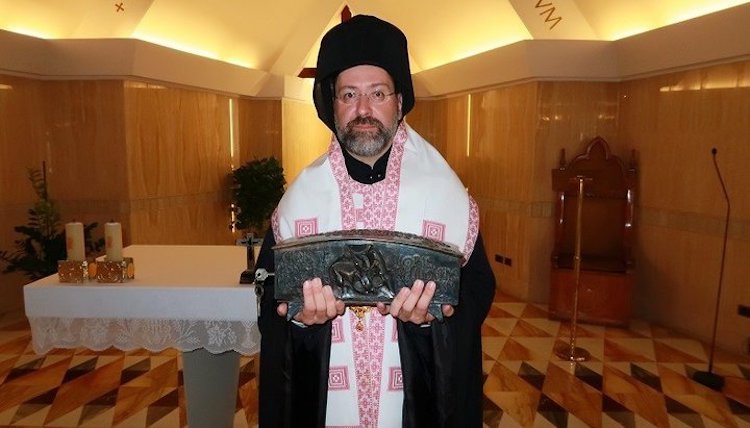
What do Metropolitan Elpidophoros and Ukraine have to do with that?
Tomos as a tool of pressure
The Tomos of autocephaly was granted eight months ago, but so far none of the Local Orthodox Churches has recognized the OCU. Moreover, representatives of the majority of Churches, including those from the top management, made it clear that they are not going to legalize Ukrainian schismatics in the foreseeable future.
Against this background, the "Tomos for Ukraine" project looks like a blatant failure for all stakeholders. Petro Poroshenko lost the election, “Patriarch” Filaret returned to the pre-Tomos state, Patriarch Bartholomew seriously lost his authority, and Epiphany Dumenko has more problems than solutions.
But almost all the Orthodox Churches expressed their support for the Primate of the UOC, His Beatitude Metropolitan Onuphry.
In this situation, the Phanar and the State Department seem to have decided to use all possible levers of influence in order to solve the problem as soon as possible. On the one hand, they use political levers of influence on the leadership of countries with a predominant Orthodox population; on the other hand, they use church levers of influence on hierarchs who do not want to recognize the OCU. And here it is primarily about the Hellas, Cyprus, Romanian and Bulgarian Churches.
On June 10, Patriarch Bartholomew organized an unexpected meeting between Archbishop Jerome of Athens and Epiphany, where a concelebration at the liturgy was supposed. But the Primate of the Greek Church refused to stay for worship and flew to Athens.
However, neither the Phanar nor the schismatics abandoned attempts to gain recognition specifically from the Church of Hellas.
On July 8, 2019, in an interview with “Ukrinform”, Eustratiy Zoria stressed that the OCU “especially needs recognition from the Church of Greece or Cyprus”. The journalist corrected him: "From all is desirable." To which he replied: “From all. But these two are exclusively influential in the family of the Hellenic Churches.”
And on July 15, Patriarch Bartholomew said in an interview with “TSN” that “the Church of Hellas would be the first Church to recognize the OCU”.
To solve the problem of recognizing the OCU, the Phanar and the State Department use political levers of influence on the leadership of countries with a predominant Orthodox population and church levers of influence on hierarchs who do not want to recognize the schismatics.
The United States is also taking certain steps. On July 10, 2019, Donald Trump, congratulating the new Greek Premier Mitsotakis, said: "Greece is one of our closest allies." In which areas is this alliance manifested? Stability in the region and bilateral trade. In other words, the Greek government was made clear that economic and social factors depend directly on the correct understanding of the signals that the White House is sending.
As yet, the US is providing demonstrative support for Cyprus.
On July 9, the State Department called on the Turkish authorities to cease exploration drilling operations off the coast of Cyprus. A spokeswoman for the State Department said that “this provocative step causes tension in the region. We call on the Turkish authorities to stop these operations and call on all parties to behave with restraint and refrain from actions that increase tensions in the region.”
Turkey refused – and after a week, sanctions were imposed on it.
It is likely that such attention is paid by the US government for a reason. The State Department has repeatedly made it clear by its actions that the recognition of the OCU is among its priorities, and, therefore, America will try to put pressure on the Church through the Cypriot authorities in recognizing the new structure in Ukraine.
The conclusions suggest themselves.
The Vatican is the unconditional centre of the Catholic world. The Phanar claims unconditional primacy in the Orthodox world. By its actions, the United States claims to be unconditional hegemony in the political world. And all these structures are in close relationships with each other and lobby the interests of this unofficial triumvirate. The issue of the OCU recognition is obviously in the sphere of interests of all three key players – the Phanar, the State Department, and the Vatican since it weakens the Ukrainian and Russian Orthodox Churches.
Therefore, the care of Tomos is hardly a subject of disinterested concern for Ukraine of our overseas Istanbul or Vatican "friends", as the bygone Ukrainian authorities liked to say. The OCU is a geopolitical project that takes into account the interests of very many players. But whether Ukrainians belong to this number is a big question.











